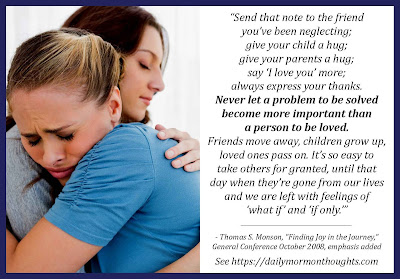"The voice of the Spirit is described in the scripture as being neither 'loud' nor 'harsh.' It is 'not a voice of thunder, neither... voice of a great tumultuous noise.' But rather, 'a still voice of perfect mildness, as if it had been a whisper,' and it can 'pierce even to the very soul' and 'cause [the heart] to burn.' (3 Ne. 11:3; Hel. 5:30; D&C 85:6-7.) Remember, Elijah found the voice of the Lord was not in the wind, nor in the earthquake, nor in the fire, but was a 'still small voice.' (1 Kgs. 19:12.)
"The Spirit does not get our attention by shouting or shaking us with a heavy hand. Rather it whispers. It caresses so gently that if we are preoccupied we may not feel it at all....
"Occasionally it will press just firmly enough for us to pay heed. But most of the time, if we do not heed the gentle feeling, the Spirit will withdraw and wait until we come seeking and listening and say in our manner and expression, like Samuel of ancient times, 'Speak [Lord], for thy servant heareth.' (1 Sam. 3:10.)"
- Boyd K. Packer, "The Candle of the Lord," talk given at a seminar for new mission presidents, 25 June 1982; see Ensign, January 1983, pp. 51-56This is a wonderful description and great warning to us. We live in a very noisy world. with many distractions competing for our attention at all hours. We have devices that play music, that broadcast news or commentary, that bring information in a variety of forms. Many of these have merit and can be used in very beneficial ways; but they also bring the danger of overuse. It takes real effort for us to find a way to quiet our surroundings and just listen.
Click here to read the full talk
Certainly this applies to our more formal times of prayer, when we communicate with Heavenly Father. We need to be sure that our efforts to address Him are also accompanied by time to listen. But it also applies to our general activities, when perhaps the Holy Ghost might have warnings or promptings to share:
And it's important to remember that listening is an active, deliberate action, not just a passive one. It's more than just cutting out noise and distractions; we have to actively seek and listen!
(Compilation and commentary by David Kenison, Orem, Utah, 2021)
March 9, 2015
March 9, 2015





































